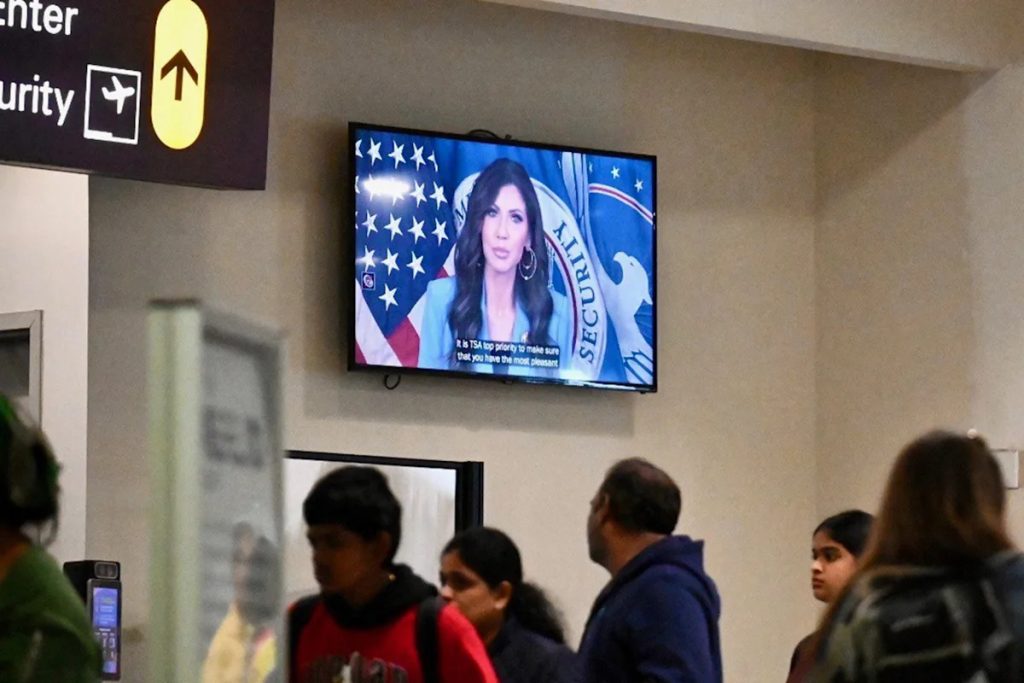Listen to the article
During the recent government shutdown, Homeland Security Secretary Kristi Noem sparked controversy by appearing in an airport announcement video that blamed Democrats for the funding impasse, raising serious ethical concerns among government watchdogs and legal experts.
“It is TSA’s top priority to make sure that you have the most pleasant and efficient airport experience as possible,” Noem told travelers in the video. “However, Democrats in Congress refuse to fund the federal government and, because of this, many of our operations are impacted — and most of our TSA employees are working without pay.”
Several major airports, including Las Vegas’s Harry Reid International Airport, declined to play the message, stating it “did not align with the neutral, informational nature of the public service announcements typically shown at the security checkpoints.”
Critics quickly accused Noem of violating the Hatch Act, a 1939 law prohibiting federal employees from using their government positions or resources for partisan political activities while on duty. The consumer rights nonprofit Public Citizen filed a formal complaint against Noem and lodged similar complaints against other executive agencies, including the Departments of Education and Housing and Urban Development, for displaying partisan messaging on their websites blaming Democrats for the shutdown.
“When the administration starts spending tax dollars to promote its partisanship, that’s when it crosses the line,” explained Craig Holman, Public Citizen’s Capitol Hill lobbyist on ethics issues.
A separate lawsuit supported by Public Citizen accuses the Department of Education of violating employees’ free speech rights by forcing them to use politically charged “out of office” messages. According to the suit filed by the American Federation of Government Employees, when workers attempted to edit these messages to be more politically neutral, their changes were overridden.
The Trump administration has populated government websites with partisan content far beyond shutdown messaging. The White House website now includes a clock tallying every second that “Democrats Have Shut Down the Government.” Other agency websites contain similar notices. The Department of Agriculture’s site, for instance, accuses Democrats of keeping the government closed “to hold out for healthcare for illegal aliens and gender mutilation procedures” at the expense of SNAP benefits for poor families.
When contacted about these concerns, White House spokeswoman Abigail Jackson told Rolling Stone: “It’s an objective fact that Democrats are responsible for the government shutdown, the Trump Administration is simply sharing the truth with the American people.” The Department of Homeland Security did not address the specific complaint against Noem.
The situation reflects a broader disregard for ethical norms that ethics experts say has intensified under the current administration. Richard Painter, former chief White House ethics lawyer under President George W. Bush and current vice chair of Citizens for Responsibility and Ethics in Washington, contrasted today’s approach with past administrations that maintained at least a veneer of self-oversight.
“I remember going over to the East Wing and telling Laura Bush’s staff over there we cannot, in our official capacity, endorse a charity, and that’s how strict we were on that with the first lady’s office,” Painter said.
Ethics enforcement presents a particular challenge since many oversight mechanisms for the president and Cabinet members exist within the executive branch itself. “The real agencies in charge of enforcing the law — the Department of Justice, the attorney general’s office, the Office of Government Ethics — are all dominated by Trump loyalists,” Holman noted.
Some Democratic-led states have responded by posting their own notices blaming Republicans on official websites, further eroding the tradition of political neutrality in government communications.
The controversy over partisan messaging is just one facet of what ethics watchdogs describe as an unprecedented disregard for ethical boundaries. While the Hatch Act violations may seem relatively minor compared to other concerns, they reflect a broader pattern that experts find deeply troubling for democratic norms and government integrity.
“Congress isn’t doing its job,” Painter concluded, noting that the Constitution provides impeachment as a remedy for such matters, reflecting the founders’ concern about government corruption after their experiences with the English monarchy.
Fact Checker
Verify the accuracy of this article using The Disinformation Commission analysis and real-time sources.




7 Comments
I appreciate airports taking a stand and refusing to air the partisan message. Government communications should be informative and non-partisan, not used to score political points. Curious to see if there are any consequences for violating the Hatch Act here.
The Hatch Act is designed to prevent federal employees from engaging in overt political activities on the job, so this does seem to be a potential violation. Governments should maintain neutrality and not use their platforms to campaign for specific parties or officials.
Absolutely. Taxpayer-funded resources should serve the public interest, not political agendas. Maintaining that balance is critical for preserving trust in democratic institutions.
This is a concerning trend that could further erode public confidence if government websites are used for partisan purposes. Impartiality and neutrality are essential for maintaining the credibility of public institutions. Hopefully clear guidelines will emerge to prevent such abuses.
Interesting situation with government websites displaying partisan content. Raises some tricky legal and ethical questions around the appropriate use of official platforms. Curious to see how this plays out and what guidelines emerge to ensure impartiality.
While I understand the desire to communicate with the public, using government websites and resources for partisan messaging is highly problematic. Neutral, fact-based information should be the priority, not political point-scoring. Curious to see how this legal debate plays out.
The line between government information and political campaigning seems to be blurring, which is troubling. Taxpayer-funded resources should serve the public, not specific political agendas. I hope this incident leads to stronger safeguards to preserve the integrity of official government platforms.